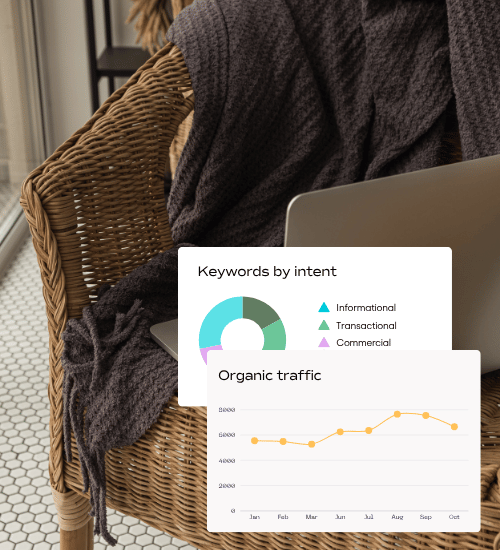
Something’s quietly (or rather, loudly) shifting under the surface. And right now, that shift is happening fast. LLM is far from a new fancy acronym. It’s how people search, full stop. We’re moving from keywords and rankings to conversations and understanding.
From keywords to conversations
This isn’t another algorithm update or an AI fad we’ll forget about in six months. It’s changed so much in the past year, and it’s how people (especially the younger gen) are starting to search. As I’m kinda old, I was there when Google became a thing, so I don’t see AI going gently into the quiet night any time soon.
For 20+ years, SEO has been built on the logic of keywords. We researched them and structured entire sites around them. It made sense — search used to be literal. Bathroom tiles? I got you, Google said.
But now, people don’t just search for a word or phrase. They ask layered, conversational questions that reveal intent, context, and even emotion. So instead of searching for bathroom tiles, they’ll ask ChatGPT: “What’s a cheaper alternative to porcelain tiles for a bathroom?” That single query contains multiple goals. Discovery, comparison, reassurance, and inspiration, and that generates meaningful suggestions.
Keywords can’t handle that kind of nuance anymore, but intent can. Forget ranking for a term, and start showing up in the right conversation. Keywords still matter for sure, but they’re no longer the strategy. What really counts now is intent – it’s the reason behind the search.
What is search intent?
Before we go any further, it’s worth talking about search intent and what it really means. Search intent is the why behind the query. It’s what someone really wants (and expects) when they search. Not just the words they type, but the outcome they’re hoping for.
Types of search intent
- Informational: looking to learn something, like “What SEO tools are best for ecommerce”.
- Navigational: looking for a specific page or brand, eg. “Ahrefs pricing for non-profits”.
- Transactional: ready to buy or act, usually “Nottingham SEO agency case studies”.
- Commercial: comparing options before deciding, such as “Best Shopify apps for reviews”.
When you understand the intent behind a search, everything changes. The way you write shifts because you’re speaking to what people want, not just a keyword. The way think about search shifts as well. You’re guiding someone through a journey, not a drive-through. Even how you measure success changes. It’s no longer about clicks, but about clarity and connection.
How AI is changing search intent
AI tools like ChatGPT, Claude, Perplexity and Gemini are trained to handle conversational flows, like follow-up questions. People are even telling it to pivot the responses, I know I do! It’s not perfect and I have to throw in another command to get the results I was expecting.
So this means our content has to pivot as well. A single page on your website can’t just answer one query anymore, it needs to anticipate the next few steps of the thought process.
That’s why optimising for intent isn’t about ticking a box or guessing the “type” of query you’re targeting. It’s about understanding the full journey someone’s on and meeting them at every step.
When you write with that mindset, your content feels less like an answer and more like a conversation. It moves with the reader. It fills in the gaps they didn’t know they had. And that’s exactly the kind of content that both people — and LLMs — love to surface.
Is keyword research dead?
My short answer? No, but it’s definitely grown up a bit.
Traditional keyword research used to be the backbone of SEO. We’d use giant spreadsheets, group them by theme, sort by volume, and feel like we were uncovering truth. And to be fair, at the time, we were. Search was literal and predictable. If you ranked for the words, you won the clicks.
But now? Keywords are just signals. It’s about topic research now.
People don’t think or search in singular terms anymore. They search like they talk. They ask questions the way they’d ask a friend. And AI models respond in that same conversational rhythm. Even if they’re pushed for time, long-tail search is still in the game. No-one goes into a furniture shop now and thinks “sofa”. They’re looking for size, material, shape, colour. Online search intent is catching up.
How to do topic research
This is where search console becomes your best friend. Don’t look at your queries in isolation, look at them in clusters. If you see queries like: “best sofa material for pets” and “sofa that doesn’t stain easily”, those aren’t separate content ideas. They form a common theme, and a conversation that flows naturally.
Instead of writing short-form content for a single primary keyword, your job is to create one strong page that guides the person through the whole decision:
- What materials exist
- Why durability varies
- What trade-offs to expect
- Which options are budget-friendly
- How to care for it once you own it
That’s what optimising for intent really means. It makes your content feel like it gets the person on the other side of the screen, not just like you’re lobbing back a one-line answer and hoping for the best.
So more content isn’t the goal – more helpful, connected content is. The kind that answers the question someone came for and the one they didn’t realise they’d have next.
Here’s how to get started:
- Go to Google Search Console you created for your website
- Filter queries by one product, category, or service page.
- Look at the patterns, not the individual keywords.
- Ask: What journey are people trying to take here?
Update your content to follow that journey. Step by step, like you’re guiding them through a conversation. You’ll notice something – content feels easier to write, it feels more natural to read, and your users spend longer on the page, because you finally wrote for the way people think. LLMs will “like” that content, and pull it into its responses and recommendations.
What this means for SEO strategy going forward
This shift doesn’t mean we all need to produce 5,000-word essays for every topic.
It just means depth matters more than scatter.
Instead of ten short pages competing with each other, create one solid piece that:
- Answers the core question
- Anticipates the follow-up questions
- Offers context and reassurance (the “why”)
- Guides the reader toward the next step confidently
I didn’t sit down to write this article and think “which keyword should I target.” I started by thinking about what someone reading this might actually be trying to figure out.
Maybe it’s:
- Why does search feel different now
- How do I adapt my content without rewriting everything
- Is keyword research still a thing in 2025
- What does “optimise for intent” look like in real life
So I shaped the article around those questions, in the order they naturally happen in the mind:
Confusion → Clarification → Understanding → Action
I also made sure every section leads into the next one. Like a conversation, not a wall of bingo words. If someone came here wondering why SEO feels different lately, the goal is they leave thinking “Ah. That makes sense. I know what to do next.”
There’s no keyword stuffing here.
No repetition that feels un-human.
Instead, I focused on:
- Clarity: Saying what I mean in plain language.
- Flow: Answering the question before it becomes a question.
- Connection: Writing how I’d explain this over coffee, not in a pitch deck.
That’s what writing for intent felt like in practice.
It’s not about being clever.
It’s about being useful,
Think fewer pages, stronger pages.
It’s quieter, simpler, and better for everyone, including AI systems trying to interpret your content.
The real goal is not more pages, it’s more clarity.
How do you feel about your content, now?
Organic SEO is evolving from keywords. It’s now about intent and conversation.
The brands and creators who win won’t be the ones who write the most. They’ll be the ones who write with purpose, and structure their content so both humans and machines can understand it.
This isn’t about optimising for algorithms anymore. It’s about clarity, connection, and being part of the actual discussion happening around your topic.
And honestly? That makes SEO a lot more interesting again.




